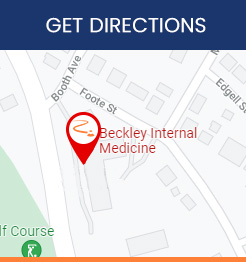Hyperlipidemia Treatment Specialist in Beckley, WV
Hyperlipidemia is a medical condition characterized by high levels of lipids in the body, which can be inherited or acquired. The condition is commonly associated with high-fat diets, sedentary lifestyles, obesity, and diabetes. There are various treatments available to manage hyperlipidemia, including medication, a healthy diet, and regular exercise. Dr. Elizabeth Thompson Nelson, MD, at Beckley Internal Medicine specializes in providing effective hyperlipidemia screening and treatment to patients. For more information, contact us or schedule an appointment online. We are conveniently located at 2401 South Kanawha Street, Ste 100, Beckley, WV 25801.


Table of Contents:
What are the signs and symptoms of hyperlipidemia?
What is the first line of treatment for hyperlipidemia?
How is hyperlipidemia commonly treated?
When should hyperlipidemia be treated?
Hyperlipidemia, or hypercholesterolemia, is the medical term for high blood cholesterol. Whilst not inherently bad, cholesterol gets a bad rap due to the fact that it’s only mentioned when levels of the ‘bad’ (or LDL) cholesterol are elevated. The other type is the ‘good’ or HDL, cholesterol. The body needs cholesterol to build cells and make vitamins and other hormones but it causes problems when there is too much of it.
You could have hyperlipidemia and not know it. Hyperlipidemia doesn’t cause symptoms, and in most cases is only apparent following an emergency such as a heart attack or stroke. The only way to know if you have hyperlipidemia is to have a blood test. It is recommended that you should have your cholesterol first tested at the age of 20 and it should be re-checked every 4 to 6 years after that – more frequently if there is a family history of high cholesterol or if the individual has high blood pressure, is overweight or smokes.
The first line of attack in the treatment of hyperlipidemia is adopting, and maintaining, a heart-healthy diet. The American Heart Association recommends minimizing the amount of trans fats in the diet and restricting the amount of saturated fat to less than 6% of the total daily calories. This means limiting the intake of red meat and dairy products made with whole milk and using skim milk, low-fat or fat-free dairy products instead. It also means cooking with healthy oils, such as vegetable oils or olive oil, and reducing fried food.
A heart-healthy diet focuses on fruits, vegetables, whole grains, poultry, fish, nuts and non-tropical vegetable oils (avocado, canola, corn, olive) while limiting red and processed meats, sodium and sugar-sweetened foods and beverages.
Hyperlipidemia is commonly treated by making some lifestyle changes such as:
– Quitting smoking is the single biggest thing that can reduce the risk of heart attack and stroke
– Exercising regularly
– Losing weight (if overweight, losing 5 to 10 pounds can improve cholesterol levels and lower the risk for heart disease)
– Eating plenty of vegetables, fruits, fish and whole grains
– Using low-fat toppings, dressings and sauces
– Avoiding foods high in saturated fat.
Dr. Nelson may prescribe medication if lifestyle changes don’t work. This will depend on:
– Your age
– Whether or not you have heart disease, diabetes, or other blood circulation problems
– If you smoke or are overweight
– If you have hypertension (high blood pressure)
– If you have diabetes
There are several types of drugs that help to lower blood cholesterol levels. Statins are one kind of drug that lowers cholesterol by blocking a substance that the liver needs to make cholesterol. This causes the liver to remove cholesterol from the blood reducing the risk of heart disease. Other drugs are available if the risk is high and statins have been ineffective.
Hyperlipidemia needs to be treated when LDL cholesterol reaches levels that are likely to cause significant risk to health.
General targets are:
– LDL cholesterol: 70 to 130 mg/dL (aim for lower numbers)
– HDL cholesterol: More than 50 mg/dL (aim for higher numbers)
– Total cholesterol: Less than 200 mg/dL (aim for lower numbers)
– Triglycerides: 10 to 150 mg/dL (aim for lower numbers)
Ideally, treating hyperlipidemia should come before emergency events thrust it front and center, but this can be difficult due to the absence of symptoms, which is where the healthy lifestyle comes in. In addition, the National Library of Medicine lays down the following cholesterol testing guidelines:
– Recommended starting ages are between 20 to 45 for women and 20 to 35 for men
– Adults with normal cholesterol levels can wait 5 years until a repeat test
– Testing should be repeated sooner if changes occur in lifestyle (including weight gain and diet).
– More frequent testing for adults with a history of raised cholesterol levels, diabetes, kidney problems, heart disease, and other conditions.
These guidelines change from time to time as more research information becomes available.
If you would like to know more about hyperlipidemia, its causes and treatment, contact Beckley Internal Medicine today! We are located in Beckley WV and serve patients from the surrounding areas. Call or book an appointment online – we look forward to meeting you! We serve patients from Beckley WV, Stanaford WV, Lester WV, Baylor WV, Bradley WV, and Beaver WV.


Additional Services You May Need
▸ Internal Medicine
▸ BioTE
▸ Medical Weight Loss
▸ Physical Exams
▸ Bio Identical Hormone Replacement Therapy
▸ Pelvic Exams
▸ PAP Smears
▸ Family Planning
▸ Diabetes Management
▸ Hyperlipidemia





